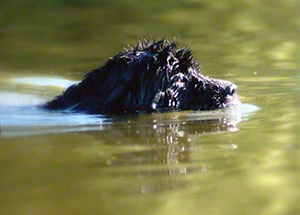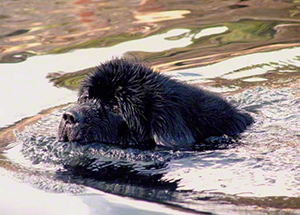The arrival of a new puppy is an exciting event, and the inevitable change in household routine will go much smoother if you’re well-prepared for the arrival of your Newfoundland newcomer. The following items and discussions should help you to get ready – or, if your puppy is already at home, to make sure you’ve covered all the bases. (If you’re not new to dog ownership, some of what’s discussed below will be familiar, but please read through the list anyway, as many of its suggestions are Newf specific. Newfoundlands’ size and breed characteristics mea n that what works for a Lab or a boxer won’t necessarily fill the bill now, or at least not when your new member of the family is full-grown.)
WATER PLAY
Newfoundlands are of course known for their love of water. While it’s certainly the case that some individual Newfs are indifferent to water, most of them love it. Even if you don’t plan to get involved in water training with your Newf, you’ll want to give him access to water. For puppies, a child’s wading pool provides an excellent introduction to the wet stuff – but be sure to supervise your young dog around water. Swimming pools are also wonderful for introducing young Newfs to water, but it is important that the dog be very closely supervised at all times and be taught how to exit the pool via the steps. If you live in a part of the country where pools (and/or hot tubs) are covered in winter, make sure you use a safety cover unless your pool is separately fenced and there is no possibility your dog can access the pool area. There is no room for error here; improperly secured pools have proved fatal.
According to the AKC "Most "pool people" will tell you that chlorine is safe at the levels used in pools. Humans swim in it and occasionally will ingest some water accidentally without great harm. A dog's eyes, nose and ears are more sensitive than a human's and as such may be a tad more susceptible to the effects of chlorine. I wouldn't want the dog to drink large amounts of chlorine. Some dogs think of the pool as one big personal dog bowl to lap up, not unlike the toilet bowl. This behavior should be discouraged. As for the ears, most infections in dogs with floppy ears are caused by water and dampness, not the chlorine in the water.
Some pool owners opt for non-chlorine chemicals like bromine or salt which may be less harmful to pets. To be on the safe side, give your dog a quick spray with the hose to rinse off the chemicals after a swim and give his ears a dab with a dry towel or use a blow dryer to keep them moisture free."

